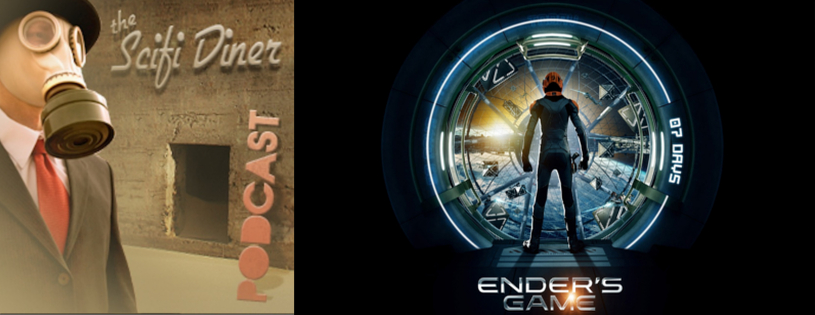Podcast: Play in new window | Download
Subscribe: Apple Podcasts | RSS
 SciFi Diner Podcast Ep. 205
SciFi Diner Podcast Ep. 205
Ender’s Game: A Morality Tale and the Development of a Innocent Killer
Download the Episode here.
The SciFi Diner Podcast
A 2012 Parsec Finalist
Please call the listener line at 1.888.508.4343,
Email us at scifidinerpodcast@gmail.com
or visit us on Twitter @scifidiner.
And check out our YouTube channel.
Tonight’s Diners: Scott, Miles, Jim, and David
Welcome to the Diner.
If you have listened to the show for sometime, we would love to have you leave feedback on iTunes. We know not all of you use iTunes, but for those that do, it helps us become more visible. If you don’t use iTunes, your feedback is still valuable. Visit our webpage at https://scifidinerpodcast.com and leave a comment on the show notes or email us at scifidinerpodcast@gmail.com We want to know what you are thinking about what we are saying and what shows you are watching.
Tonight:
Ender’s Game (1985) is a military science fiction novel by American author Orson Scott Card. Set in Earth’s future, the novel presents an imperiled mankind after two conflicts with the “Buggers”, an insectoid alien species. In preparation for an anticipated third invasion, children, including the novel’s protagonist, Ender Wiggin, are trained at a very young age through increasingly difficult games including some in zero gravity, where Ender’s tactical genius is revealed.
The book originated as the short story “Ender’s Game”, published in the August 1977 issue of Analog Science Fiction and Fact. Elaborating on characters and plot lines depicted in the novel, Card later wrote additional books to form the Ender’s Game series. Card released an updated version of Ender’s Game in 1991, changing some political facts to reflect the times accurately; most notably, to include the collapse of the Soviet Union and the end of the Cold War.
Reception of the book has generally been positive, though some critics have denounced Card’s perceived justification of his characters’ violence. It has also become suggested reading for many military organizations, including the United States Marine Corps. Ender’s Game won the 1985 Nebula Award for best novel and the 1986 Hugo Award for best novel. Its sequels, Speaker for the Dead, Xenocide,Children of the Mind and Ender in Exile, follow Ender’s subsequent travels to many different worlds in the galaxy. In addition, the later novella A War of Gifts and novel Ender’s Shadow take place during the same time period as the original. Ender’s Game has been adapted into two comic series.
A film adaptation of the same name directed by Gavin Hood and starring Asa Butterfield as Ender was released in October 2013. Card co-produced the film.

Neil Ottenstein May 18, 2014
Great discussion. It was quite enjoyable.
On the Speaker of the Dead wiki page Orson Scott Card is quoted: At the Los Angeles Times Book Festival (April 20, 2013), Card stated why he does not want Speaker for the Dead made into a film: “Speaker for the Dead is unfilmable,” Card said in response to a question from the audience. “It consists of talking heads, interrupted by moments of excruciating and unwatchable violence. Now, I admit, there’s plenty of unwatchable violence in film, but never attached to my name. Speaker for the Dead, I don’t want it to be filmed. I can’t imagine it being filmed.”
There were other possible sequels to the film that did not involve Speaker for the Dead which are described various places.